CRESTON - LEGACY OF AN ERA PAST - Teresa Stutler Starcher
The old man leaned heavily on his cane as he stopped to take a breath or two of the crisp country air.
"Are you makin' it, Grandpa?" inquired his ten-year old great-grandson, with concern.
"Yeah, Jamie, I'm just fine; thought I might pause here a mite to look around."
They were walking along the black-top lane beside the West Fork River. It was a warm day of early fall; most of the leaves had fallen, which gave this tiny hamlet in Wirt county an even starker appearance than usual with its scattering of houses and its population of around 50.
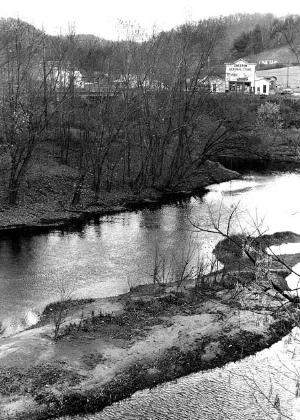
Creston - 1993
(Photo by Thom Kellam, Chloe, WV)
His eyes, blurred, aged from the many years that he had stood near this very spot surveying this same terrain. Gracious, how most of it has changed over the years he thought as he muttered aloud a tut-tut.
He tried to recall all that his father had told him and he probed deep within his memory in order to bring to life his experiences and recollections of a lifetime spent amidst an irrecoverable era of by-gone days - Creston in its heyday.
As he peered down the Little Kanawha River, deep in reverie. A mist seemed to envelope the actual scenery before him and a faint sound came to his failing ears, which were unaided by a much-needed hearing-aid. He instinctively cupped his ear with his trembling hand. The faint sound became louder in his imagination as a vision appeared.
The circus-like music of a calliope was plain now, along with the form of a showboat. Children squealed with glee as they ran in droves from houses, muddy streets and fields, to greet this enchanting arrival that would break the monotony of their labor-filled lives. The musicians and magic acts brought joy to old and young alike. Yet the silent movie was the greatest treat for all.
This silent film was always an uproarious event in that the people who could read, would read aloud simultaneously, to those who couldn't, so that everyone could fully enjoy the film.
His joy at the arrival of the imaginary showboat was still as great today as when he was a child; accordingly, he merrily chuckled out loud.
A sharp tug on his jacket tail brought him back into reality.
"Grandpa, I am talking to you. What is so funny? Do you hear something, Grandpa?"
The old man looked down into the sparkling, inquiring eyes of the lad. Then with a hand; blotched with age spots, wrinkled, and marred by years of hard labor, he patted the sandy head of the freckled-faced boy. And with a tender smile he answered the boy's inquiry."I'm remembering for you, Jamie."
"For me, Grandpa?"
"Yeah, I'm getting old and forgetful, so I want to tell you things like my pap told me when I was about your age."
"Like stories, Grandpa?" he asked gleefully.
"Yes, he laughed, "But true facts too, like how things hereabouts used to be."
He gazed about the area, wondering where and how to begin.
He realized that it would be difficult to get the boy to visualize the metropolis that once flourished here.
It was very peaceful on this day, as the old man let his eyes wander up and down the river. Although still very much aware of the boy by his side; his mind wandered backward - back in time.
He pictured himself as a boy of this age. The scene before him changed from a struggling, wide stream of water, fighting its way around great mounds of driftwood, piled upon islets of sand and mud, which grow larger with each passing year--by raises in the river--with the banks covered with dying stalks of horse-weeds, and brush; into one of a smooth flowing, deep, murky green river, where gas boats and a couple of steamboats are shuttling in and out from its wharf or moored along its banks, which were worn slick with wooden steps and boardwalks aligning them.
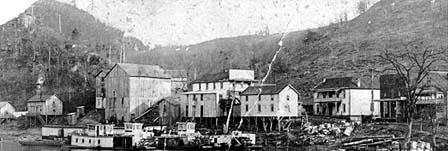
Creston Waterfront - About 1906
It was far from peaceful and quiet back then with the hubbub of boats being loaded or unloaded, when over 100 loads a day were shipped in and out. The clamorous hustle and bustle along the banks and earthen streets, reflected the commerce so important to the livelihood of the town and outlying regions.
The sights and sounds were entrancing for him as a boy and even now as he vividly reclaimed this memory, a surge of vigor coursed within his aging form. He recalled the steamboat whistles, and the put-put, chug-chug of gas boat motors, as great bundles of cloth, crates, barrels, along with goods of all description were placed aboard or removed. He heard: horses nickering, clinking of chains, mules braying, oxen bellowing, teamsters shouting orders to their teams, saddles and harness creaking, the fluttering rumble accompanied by the tinkling rattle of trace chains as horses in harness shook themselves; the clip clop of hooves, men shouting greetings and advice to one another, boots and shoes thumping and pounding along the boardwalk that aligned the streets; the clattering of wooden wagon beds with their squeaking of wheels, as they rumbled along; the thumping and scraping of pipe or equipment being loaded into wagons to haul to a well site.
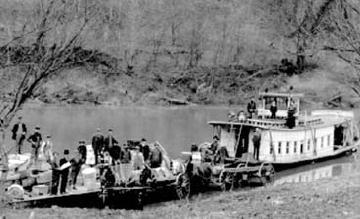
Unloading Cargo
He remembered the teams of horses, matched and unmatched, standing along the streets and banks, awaiting their turn to gain access to the wharf. Some horses stood quietly sleeping, others blew and snorted as they stomped about impatiently.
Ladies of all ages buzzed from store to shop. The swishing of their long skirts indicating their rush to examine the newly-arrived goods.
As late as 1918, the town livery stable provided mounts and rigs for passengers arriving by boat and also fresh teams for the stagecoach that ran to Grantsville daily. It was by far shorter to travel by stage, even though the gas boats could operate above the slack-water on into Grantsville and beyond; they carried freight and handled mostly oil and gas well materials.
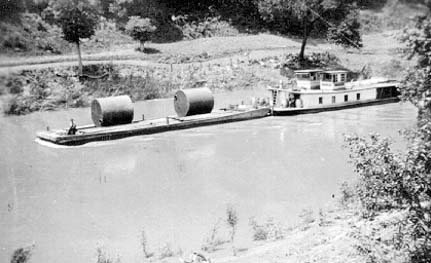
"Pride of Pittsburgh" Transporting Oil Field Supplies
With a flourish of his hand toward the junction of the Little Kanawha and mouth of the West Fork, he stated in a resonant tone of voice. "At one time there was around 65 major steam and gas boats running from here to Parkersburg regularly. The wharf boat over there was always crowded."
He then turned to look behind him at the building, which was, and always would be to him, a monument of an epoch long past, but not forgotten; a warmth spread through him as a surge of enthusiasm, fueled by his nostalgia, overtook him.
Sweeping his hand toward the stately old building, he exclaimed. "When I was a boy, I got candy in that very store, just like you do now. It has served this community for generations." He chuckled, then added. "Although like everything else around here, -penny candy is a thing of the past."
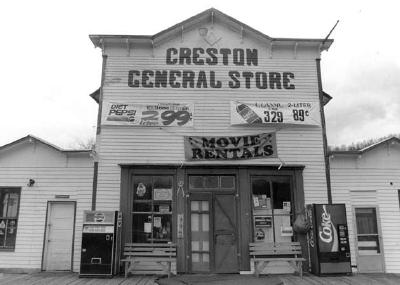
Creston Store - 1993
(Photo by Thom Kellam, Chloe, WV)
Then, turning around, he pointed to his far left.
"That there, Jamie, is the Little Kanawha River. She don't look like much right now, but she can still get ornery."
"Ornery, how, Grandpa?"
The aged townsman gazed fondly at the river. It was running lazy and low between its brushwood cluttered banks, and he could see several sandbars as the afternoon sun twinkled upon its riffle.
"Oh, floods," he answered. " We have had to run johnboats up and down this roadway several times. Then, I remember way back in 1930, she went and did the opposite; she went dry- I mean, bone dry- but, it wasn't her fault, cause we never got a drop of rain around this whole territory for well over two months. We couldn't run the ferry to get across her and what was left of the freight boats couldn't make their runs. It was hard times for everybody then."
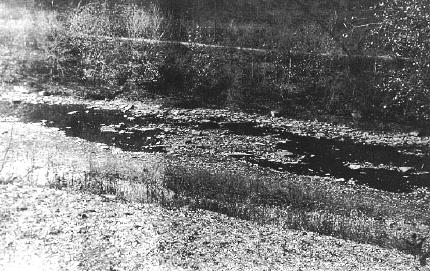
Little Kanawha River During 1930's Drought
"What did you do, Grandpa."
"Well, the freight boats and passenger boats wasn't as important to the people at that time like they was ... oh, about in the 1870's to about 1923 when the main road was graded out. Anyway, what they done here was span her dry bed with two ferry boats placed end to end, so folks and goods could still travel from place to place."
The boy craned his neck as he stood upon his tiptoes to get a better view of this river which his grandsire was telling him was so important to people. Then with a puzzled expression tugging at his features, he declared. " Maybe she's going dry again, Grandpa. What happened to her water now?"
"Mighty fine reasoning boy," He spoke encouragingly, as he smiled down into the boy's round eyes, before he launched into his, lengthy, and no doubt for the boy, complicated reply.
"She's low now like she was back in the 1850's. Back then folks couldn't use her to run the steamboats or float out the timber to market unless she had been raised by heavy rains. So, right after the Civil War, a smart fella by the name of Camden, from Parkersburg, leased the river, or parts of it, from the federal government.
He got together with some more fellas that had money to back him. Also the B&O Railroad helped them, cause another railroad, named after this river, ran up from Parkersburg to the river at Owensport, which is about 18 miles down the river from here. Anyway, these smart men figured out a way to make the river have a raise in her all the time."
"They made a flood! How?" Jamie interrupted excitedly.
His elder laughed appreciatively, then continued. "No, not a flood. They built small dams, or a lot like a dam. They're called locks. These had a passageway for boats and the timber rafts to pass through. The men built four of them from Parkersburg to Palestine. Then around 15 years later, the federal government saw how important higher water for river traffic could be for everyone, so they built another lock at Burning Springs, about seven miles from here, so that put water higher even two miles above us. This made Creston very important.
Folks up on the West Fork and all over this county, and even other counties, like Calhoun,Gilmer, Braxton, and parts of Roane, depended on Creston as a place to ship out or bring in goods and freight along with their mail. Why, boats came and went here day and night."
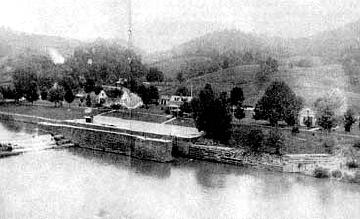
Lock No. 5 at Burning Springs
"Tell me about the boats, Grandpa. Was they big?" His inquiry, tinged with awe, renewed within the old man the same emotions that he experienced when a boy of Jamie's age.
"Well, yes they were pretty big, the steamers that is. Most of the gas boats weren't as big. They couldn't make it up the river if they were too large. You see, at the locks the boats had to be able to pass through, or "locked", as they called it. The locks were about 23 ft. wide, so the boats had to be narrow enough to get through. One steamer really had a snug fit squeezing along the lock. Its name at first was the "W. A. Hilton," but when she was sold, the new owner changed its name to the "Kathryn."
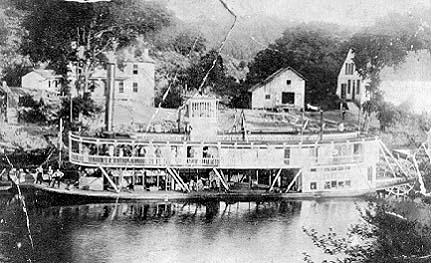
Steamboat "W.A. Hilton" Moored at Creston - About 1896
"My pa told me all about the boats and he said that "Kathryn" was such a beautiful boat. She had three decks, with fancy trim around the railings. The pilothouse, behind her smokestacks, had pretty carvings, that stood out like a crown on this whitewashed princess.
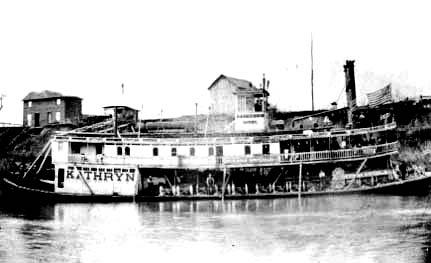
"Kathryn" as a Steamer
"I remember the paddle wheels churning the water as these steamers came up the river. The steam puffed high in the air; and as they got closer to landing, they'd hit their whistles. I always loved to hear those--too... toots! Pa told me that the "Oneida" didn't have a big whistle pipe, but it had the best sounding whistle you'd ever want to hear, so loud and mighty. He always knew when she was coming in--everyone did."
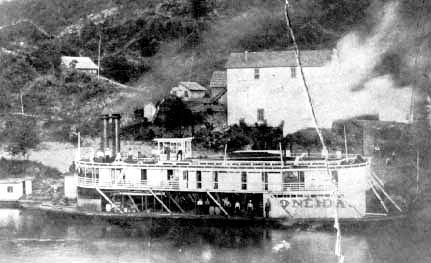
"Oneida"
"Did you ever ride on her, Grandpa?"
No, boy, I never got to even see her, for she sank right here in Creston, in January of 1902; her hull got cut by ice." He glanced down into the boy's face and noted his gloomy countenance. The old man felt concerned, yet he wasn't sure if the boy was sad, because of his admitting to have never seen nor rode the "Oneida," nor of its fate.
He needed to restore the boy's sagging spirit, so he hastily reassured him. "But that wasn't really the end of her, for they salvaged most of her and changed her into a boat they named the "French." And I did get to ride on the great boats. I remember well the "Louise," a grand steamer over 100 ft. long.
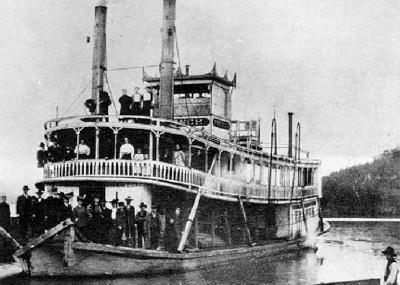
"French"
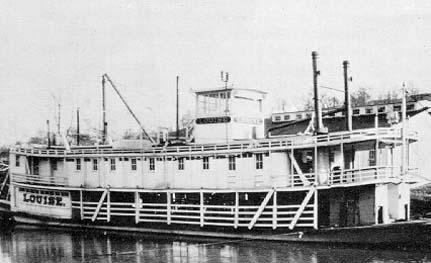
"Louise"
"I went to Parkersburg with my pap one time. I was a little younger than you; I s'pose I was around seven. What I recall most about it was the lights, and especially the big headlight, so the pilot could see to steer around the sharp bends in the river. I got too sleepy hearing the paddle wheel churn the water. I tried to stay awake to take everything in, but I fell asleep watching the big headlight on the water."
"I'd like to see one, Grandpa, an' get to ride on it too," he said longingly in a small voice.
"I wish you could boy, but that time is long past, at least around here," he answered regretfully.
"Are they anywhere now?"
"Yeah, some still run on the Ohio, Big Kanawha and Mississippi."
"I'll go see them some day, Grandpa. I will. And I'll think about you--all you said-- and this place. I will always remember."
The old man reached out and placed an unsteady hand upon the boy's head and stroked his hair lovingly, as tears welled within his eyes. He choked back the lump in his throat, caused by the boy's words.
"Yes Jamie, I want you to remember. It's hard to believe that at one time this town, or what's left of it, had two area post offices, three large general stores, a huge livery stable, and several thousand people ... or, so I'm told. I remember when about your age and younger, that it was still a very lively place."
"What happened, Grandpa?"
"Well sir, I would say right off that it was better roads being laid out. But I think it was also the big fires. The first one happened in 1897 when my pap was about 11 years old. He told me all about it. Creston was the head of navigation then--er--you know, boats and shipping and such. But that fire burnt the largest store in the Little Kanawha Valley, along with three other buildings. Then the second big fire was in 1917 or 18. 1 remember it for I was your age."
"Was it real scary," the boy inquired with wide eyed awe.
"Yes, and very sad for three people lost their lives. Over 14 buildings were destroyed then, two hotels, three general stores, and a post office. And being a kid, I really hated it when the candy store and bakery went up. It was also a mighty ruckus when the livery stable caught fire." He pointed across the river to the site of this long gone hostelry.
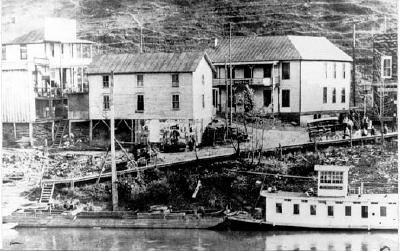
Creston Before the Fire
"It set just about where the end of Route 5 bridge is now--going toward Grantsville. It had four stories, built like steps right up the hillside. I can't remember whether they got out all of the horses or not, for the hay made it go fast."
"Did you have horses then?" Jamie asked excitedly.
"No, our family just had one ole plow mule. But Pap and me both worked teams for other people. Pap always worked at timbering. I liked doing different things. I guess I've been "a jack of all trades". But I've always loved working with horses. With two teams, a wagon could carry around 2,500 lbs. of freight. Also a good load might be 15 to 20 barrels full of oil."
He sighed wistfully, as reverie again turned back his years-to a time when he had helped the teamsters haul loads of casing to the well sites. He relived the scene: Necks bow and strain forward into their collars, as muscles bulge against jack-straps that are tight as bow strings. The crupper goes slack, as the horses weight and strength is thrown forward. Mud splatters, squashes and makes sucking noises around the horses' legs and feet. Clumps of mud fly all around behind, flung from the digging and sliding hooves as the horses lunge forward, trying to find and keep their footing. Sides heave - grunts of exertion .
Chains rattle; then slam taut, slacken, then slam taut, with each digging, scrambling, lunge of the team. The horses' coats change color as their bodies become wet with sweat; white glops of lather foam up and fly from between their back legs. The teamster fights the check lines to keep the team pulling side by side. He barks commands,; "Come up! Get! Get! Get!" His eyes must stay attentive to the traces and keep the tugs even.
As he struggles to maintain his own footing in the mire, he must watch the horses' legs. The team must lunge together and pull at the same time, one must not step backward as another lunges forward. The mark of a true teamster is keeping his team or teams synchronized, even under adverse conditions.
He recalled the stories that his father had told him about the teams of horses and yokes of oxen, that had made it possible to harvest acre upon acre of huge virgin timber. Snaking out timber logs was hazardous to man and beast alike.
His father also told him about the mighty fleets of timber that often packed the river from bend to bend. The old man glanced up the West Fork where his father had told him was the site of the stationary log boom. Here the logs were marked like a cowboy brands his stock. At "high water" they were floated out and bound together into rafts. Each raft was 22 ft. wide, so as to clear the locks, and up to 124 ft. long. Then, 30 to 50 rafts were loosely bound together into a fleet.
Guided by large oars, mounted on bow and stern, along with long poles to push away from the banks, the fleet could navigate on to the mills at Parkersburg. This trip took about three weeks to complete, and a crew of six men were needed. They would build a small shanty upon one of the rafts as living quarters during the trip. When they reached a lock, the fleet was taken apart and "locked" through one raft at a time, and then bound back together below the lock.
It was said that 1,000 locks of timber were brought through each year. Timber used in the growth of the nation; thousands of miles of railroad ties, barrels for oil, crates for goods, barns, boats and housing.
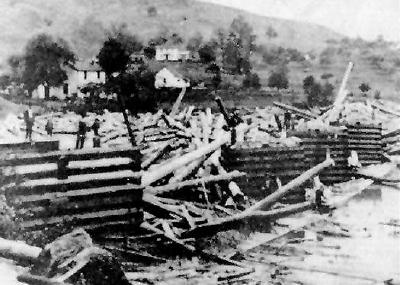
Log Boom At Creston
Those days had served their purpose well at the time. Now, there is no more of a need for; the yoke of oxen, the teams of mules and horses, the fleets of timber, the boats, nor the sturdy men who heartily began work before daylight and labored, with calloused hands, beyond dusk; for the loggers, boatmen, teamsters. Gone--all gone, he reflected sadly.
A sharp tug on his sleeve brought him back to reality. "Hear me, Grandpa? I said did any boats burn up?"
"Er ... boats? Burn up you say?"
Yes," the lad answered, impatient for a reply."
"Not during the big fires, I don't think. But, my pap told me about a gas boat wreck here in 1904. one called the "A. C. Barney," bumped a barge that was being towed along by a towboat named "Darling." The "Barney" didn't hit very hard, but it still was enough to break a gasoline line from the tank to engine. In a jiffy, the "Barney" was all afire--the black smoke just a rollin'. Its skipper, Captain Hiram Douglas, had to jump free an' really stroke, stroke, for dear life." The elder man chuckled impishly, then continued.
"Most of the gas boats were cheaply built using oil well belts, sprockets and one-lung engines. The danger of fire or explosion didn't hinder their popularity much, for they could run in very shallow water; unlike the steamers, the gas boats only needed about a foot of water. Why, one ole pilot said one time that they could "run right up Main Street on a wet night". Yeah, some of these boats were kinda fancy.
The "Grantsville" was a big two-decker. In 1918 the "Edith H" was our mail packet, she ran from here to Owensport, where the B&O Railroad ended its line from Parkersburg. I remember best the "Dove" and the "Hilton." Also the "Louise" was built first as a gas packet, but was changed to steam and made bigger. She was the last paddle-wheel steamboat to run this ole river. The "Eugene", was built here by a "local" in 1920, and as far as I know, it was the last freight boat to run here. For in '29 it was sold off to the Monongahela and became A. W. Kisinger's pleasure boat - a good thing to happen with it - its end could have been much worse."
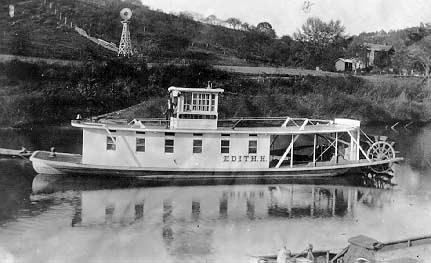
"Edith H."
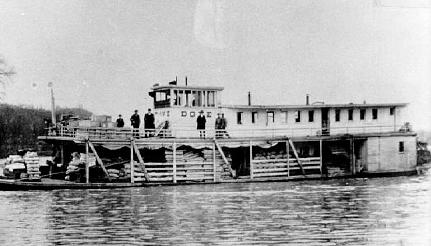
"Dove"
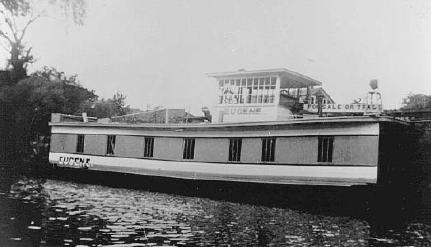
"Eugene"
At this the elderly gentleman heaved a sigh of regret, as he pondered the demise of these spluttering workhorses of the river. For, as along the trails of the early pioneers, the bleached bones of their beasts of burden were strewn, so it was, that for many years the hulls of several of these great vessels of burden could be seen rotting along the banks of the Little Kanawha.
He gazed out over the river. He fancied that he again could hear the music of the showboat. The circus-like music was very fitting, for as the circus packs up its big top and moves on, so it was for the era of the great steamers, and the industrious gas boats.
"Let's go home now, Jamie," he stated wearily.
"Okay, Grandpa, but we'll talk another day?"
"Yes, another day."